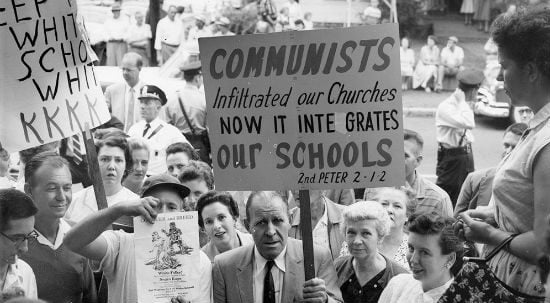Fr. Broderick Greer — an Episcopal priest in Memphis you should be following on Twitter — draws our attention to this astonishing passage from a recent article in Christianity Today defending the no-cakes-for-gay-weddings ideology of economic/religious liberty:
What is at stake for religious Americans in this conflict is not the “we don’t serve your kind here” discrimination of the old segregationist lunch counter. That sort of injustice is as odious to them as it is to any other fair-minded American. Their religious convictions call them to stand against such discrimination, not with it. But they also believe this history makes for a bad analogy with our current situation, in two important ways.
First, for those segregationists who denied black Americans a seat at the lunch counter, there were no moral or religious issues at stake. There was only bare-knuckled racial discrimination. But the gay issue is different; it inherently raises for many people, not all of them religious, a host of moral questions. This makes the racial analogy a misleading one. It ignores this difference, thereby confusing the issues rather than clarifying them.
Second, and even more important, the analogy with racial discrimination obscures the core dilemma for religious people. That dilemma has to do with the issue of complicity.
This is a piece by Duane Litfin titled “Christians Don’t Want to Stop Serving Their LGBT Neighbors.” Litfin is the president emeritus of Wheaton College (Illinois), so he really ought to know better. And the folks at CT who agreed with Litfin’s utterly false contentions there certainly know better. They work at Christianity Today, after all, a magazine that spent much of the Civil Rights era arguing for and defending what it insisted were the “moral and religious issues at stake” in preserving segregation.
Christianity Today was co-founded by L. Nelson Bell — Billy Graham’s father-in-law and also the founder of The Southern Presbyterian Journal, a pro-segregationist magazine explicitly dedicated to what Bell (a Wheaton graduate) called “racial integrity.”
Bell’s argument in opposition to the Civil Rights movement was irreducibly and emphatically “moral and religious.” He categorically denied that “bare-knuckled racial discrimination” or animus had anything to do with his position. It was, he insisted, a matter of faithfulness to God and of defending the authority of the Bible. The Bible, Bell said, clearly taught that black people were under the “curse of Ham,” that God had ordained the geographic and cultural separation of the races, and that God forbade miscegenation.
Exactly like the white Christian defenders of American slavery a century earlier, Bell cited biblical prooftexts to support all of those assertions, and framed the entire disagreement as a debate about biblical truth and biblical authority. Those who disagreed with his interpretation and application of those prooftexts were thus, in his view, turning their backs on the Bible itself. He declared that he wasn’t primarily pro-segregation, but pro-Bible. And anyone who disagreed with him, therefore, was anti-Bible.
Christianity Today — run by Bell’s son-in-law and his son throughout the 1950s and ’60s — wanted to make it very clear that they were not anti-Bible. Here, again, is a key paragraph from Peter G. Heltzel’s Jesus & Justice: Evangelicals, Race & American Politics, discussing the magazines coverage of the march in Selma:
In 1965 [Carl] Henry sent Frank E. Gaebelein to cover the march in Selma, Alabama. An associate editor of Christianity Today and the founder and headmaster of the Stony Brook School, New York, Gaebelein went to Selma and was so inspired that he wired Henry in Washington, DC, that evangelicals needed to join the march. But Gaebelein’s stories of the Selma march never saw the light of day. The resistance at Christianity Today was coming primarily from two people: J. Howard Pew, the Texas oil man and the financer of Christianity Today, and L. Nelson Bell, Billy Graham’s father-in-law and an editorial adviser at Christianity Today, who still had segregationist views. Pew and Bell did not want Christianity Today to speak out too critically against racism and capitalism, because they thought it would alienate important segments of the magazine’s constituency.
Henry commendably published Gabelein’s first report from Selma and it did, indeed, “alienate important segments of the magazine’s” white evangelical constituency. So Henry thereafter surrendered to the views of Bell and Pew and of those angry “constituents.” Christianity Today, like Bell’s Southern Presbyterian Journal, went back to defending the authority of the Bible from anti-Bible agitators for civil equality.

Whatever one thinks about the degree to which “bare-knuckled racial discrimination” drove the angry backlash of this white evangelical constituency, that’s not how those folks themselves described their opposition to the march in Selma and to Gabelein’s sympathetic reporting on it. They described their opposition, rather, as arising from the “moral or religious issues at stake.” They insisted they were defending the authority of the Bible and acting out of faithfulness to God. They insisted that they weren’t prejudiced — just defending their religious liberty to act in obedience to the authority of the Bible.
In other words, they made precisely the same argument that Duane Litfin is making now, based upon precisely the same hermeneutic.
And just like Litfin, they viewed themselves as striving to avoid “complicity.” That’s the central point of Litfin’s argument — avoiding complicity in the legal recognition of equality that good, Bible-fearing Christians rightly understand to be anti-Bible.
The moral logic of this argument is purity-driven, based on an unexamined presumption of moral purity. Innocence and moral purity, Litfin assumes, is the starting point for white evangelicals in America. They exist in an unsullied, uncontaminated state of grace, but that innocence is threatened when they are asked — or compelled — to participate in the vile contagion of sin presented by anti-Bible notions of legal equality. Jim Crow and anti-miscegenation laws protected this innate purity for an earlier generation of white evangelicals, preventing them from becoming complicit in what they said was an anti-biblical denial of the “integrity of the races.” And Litfin hopes for “balanced” laws defending “religious liberty” to protect his generation of white evangelicals from complicity in a similar anti-biblical threat.
Looking back, fifty years later, almost everyone understands that the real problem of “complicity” for white evangelicals in the Civil Rights era involved their defense of an unjust status quo. Their complicity — their sin — was their complacency or, even worse, active defense of segregation, disenfranchisement, plunder, and oppression. What they feared as “complicity in sin” was, in fact, their only hope for redemption — for salvation. Those white evangelicals were unable to see that, in part, because they imagined they didn’t need salvation. They imagined they already possessed moral purity and innocence, and that their only obligation, therefore, was to avoid “complicity” in the worldly sins of others.
Litfin — and the folks at Christianity Today who chose to publish his article — are unable to learn from the mistakes of that earlier generation of white evangelicals. And so they repeat them, demanding a benefit of the doubt that they are unable to extend to their predecessors. Litfin insists that he and his contemporaries who oppose civil and legal equality for LGBT people be regarded as sincere, pure-hearted, loving Christians devoid of any personal interest or animus, motivated only by their desire to faithfully adhere to the authority of the Bible and to avoid complicity. But he refuses to afford that same benefit of the doubt to his white evangelical predecessors — insisting they could only have been motivated by “bare-knuckled racial discrimination.” He doesn’t simply claim that their explicitly biblical and pervasively “moral and religious” arguments were disingenuous, he pretends they never made such arguments at all.
Again, Litfin ought to know better. He ought to know that those earlier white evangelicals did, in fact, make such biblical, “moral and religious” arguments. And the folks at Christianity Today ought to know that their magazine itself made and published those arguments.
But they can’t afford to do that. Today, in 2016, Litfin and CT want to deny the conclusions of those earlier “moral and religious” arguments, while still insisting that all real, true evangelicals are obliged to retain the premises of them. They want to retain the hermeneutic they inherited from Bell, et. al., while somehow avoiding the inevitable implications of it. They want to cling to the old equation and pretend it might somehow provide them a different answer.
But it never can and it never will.
















